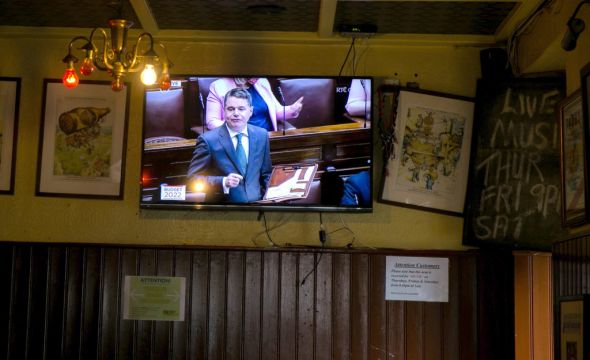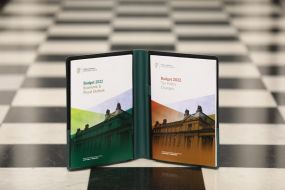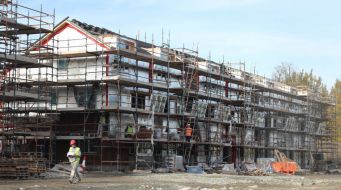Budget 2022 has been unveiled in the Dáil this afternoon by Minister for Finance Paschal Donohoe and Minister for Public Expenditure and Reform Michael McGrath.
Some key new measures are:
- Minimum wage will rise by 30 cent to €10.50 an hour.
- Working age welfare payments, including the jobseeker's allowance, will rise by €5 a week.
- Pensions will also rise by €5 a week.
- Back-to-school allowance will rise by €10 and the living alone allowance will rise by €3.
- The weekly fuel allowance will rise by €5.
- The qualified child payment will increase by €2 to €40 for under-12s, and by €3 to €48 for over-12s.
- The Employment Wage Subsidy Scheme (EWSS) will be extended until April 30th 2022.
- Income tax standard rate band to increase by €1,500 from €35,300 to €36,800.
- Increase of €50 in each of the personal tax credit, the earned income credit and the PAYE tax credit.
- USC ceiling for the second rate to increase to €21,295 from January 1st.
- Weekly income threshold for higher rate of employer's PRSI will go up from €398 to 410.
- Employees will be able to claim back 30 per cent of vouched expenses for heat, electricity and broadband for working from home.
- Extra spending for education will see 980 teachers and 1,165 special needs assistants hired, with some 350 additional teacher posts to reduce class sizes. There will also be an additional 3,320 CAO places.
- A new Zoned Land Tax will be introduced to replace the vacant sites levy.
- Tax rates for new cars with emissions over 110g/km are set to increase by between 1 per cent and 4 per cent.
- Anyone aged 19 to 23 will receive a 50 per cent discount on public transport.
- The excise on a 20-pack of cigarettes will rise by 50 cent, pushing the price up to about €15 a pack.
- Free GP care will be extended to children aged six and seven.
- There will be an extra two weeks of parental leave from next August.
- Decrease in the Farmers Flat Rate Addition from 5.6% to 5.5%.
Pandemic supports
The Employment Wage Subsidy Scheme (EWSS) will be extended until April 30th 2022. There will be no change in payment levels in October and November. In December, January and February, a two-rate structure of €151.50 and €203 will apply. In March and April 2022, a flat rate of €100 will apply. The scheme closes to new entrants from January 1st 2022.
A €4 billion Covid-19 contingency fund is also being created in light of the pandemic.
Tax and work
Employees will be able to claim back 30 per cent of vouched expenses for heat, electricity and broadband for working from home.
An income tax package of €520 million will see personal tax credit, employee tax credit and earned income credit increase by €50. The rate at which people pay a higher rate of tax will also increase by €1,500.
The minimum wage will rise by 30 cent to €10.50 an hour.
The ceiling for the second band of USC will rise from €20,687 to €21,295 to support those on minimum wage. The USC exemption for medical cardholders and those over 70 earning less than €60,000 will remain in place.
The reduced VAT rate of nine per cent for the hospitality sector will remain in place until August 2022.
Welfare
A €558 million welfare package will see a €5 weekly rise for working age welfare payments, including the jobseeker's allowance.
Pensions will also rise by €5 a week. Other increases will see the back-to-school allowance rise by €10 and the living alone allowance rise by €3.
The weekly fuel allowance will rise by €5 immediately.
The qualified child payment will increase by €2 to €40 for under-12s, and by €3 to €48 for over-12s.
Housing
€20 billion will be made available for housing measures over the next five years. €6 billion allocated to housing next year represents a 15.6 per cent rise on 2021, while €174 million will go towards the direct delivery of 4,000 affordable homes in 2022.
A Zoned Land Tax will be introduced to replace the vacant sites levy, applying to land which is zoned for housing and serviced but is not being developed. The rate will be three per cent of market rate.
The help-to-buy scheme will be retained for 2022 at current rates and reviewed next year.
There will be a three-year extension to pre-letting expenses relief for landlords.
€1.6 billion will also be invested in water services next year.
Climate
Some €700 million is allocated for capital spending by the Department for Climate, with €202 million of this for home retrofitting supporting 22,000 energy upgrades.
There will be a €7.50 increase in the carbon tax, which will be reinvested in social welfare measures on fuel poverty and a just transition. This will result in an estimated €1.28 extra on a 60-litre tank of petrol and €1.48 more for a full fill of diesel.
Tax rates for new cars with emissions over 110g/km are set to increase by between 1 per cent and 4 per cent. It means the top rate of Vehicle Registration Tax (VRT) will be 41 per cent. Changes to the VRT regime from January 1st will see a 1 per cent increase in the rates on cars with emissions between 111g/km and 130g/km; a 2 per cent rise for cars with emissions of 131g/km to 145g/km; and a 4 per cent rate increase for cars with emissions over 146g/km.
The €5,000 VRT relief for electric vehicles will be extended to the end of 2023.
Business
The Employment Investment Incentive scheme will be extended for three years and will be opened up to more investment funds. There will be a relaxation of the rules around the capital investment window for investors, and the 30 per cent expenditure rule will be removed.
The Innovation Equity Fund will receive a further €30 million, matched by €30 million from the EIB.
Corporate tax relief for certain start-ups will be extended until the end of 2026.
Consumer products
The excise on a 20-pack of cigarettes will rise by 50 cent, with a pro-rata rate on other tobacco products. The price of most popular cigarettes now €15.
Education
€9.2 billion in funding for education will see 980 teachers and 1,165 special needs assistants hired, with some 350 additional teacher posts to reduce class sizes.
€18 million is allocated to increase the number of DEIS schools, and €4 million to increase the allocation of hot school meals.
An additional 3,320 CAO places will be created as part of a €68 million investment in higher education.
Student maintenance grants for more than 60,000 learners will climb by €200 from next year.
The eligibility cut-off point for Susi student grants will increase by €1,000, meaning more families will be entitled to access grants in the new academic year.
Healthcare
Core health spending is to increase by €1 billion to a record €20.38 billion.
There will be a fund of €1 billion for the health service in 2022 for Covid-19 health measures, down from €2 billion in Budget 2021. The fund includes €500 million for testing and tracing, the vaccine booster campaign and PPE.
€10.5 million in funding for 19 extra intensive care beds in 2022 will bring the total to 340, representing a 33 per cent rise since the start of pandemic.
A €250 million fund will tackle waiting lists.
Free GP care will be extended to children aged six and seven, and there will also be changes to children’s hospital charges.
The Drug Repayment Scheme limit will decrease to €100 from €114.
A women's health package of €31 million will see free contraception for women aged 17 to 25 from next August, progress on period poverty, and more funding for sexual assault treatment units.
There will also be €105 million in funding for disability services, €37 million for the expansion of mental health services and €30 million for national strategies including for cancer.
Some 8,000 new posts will be staffed across the health system.
Childcare
A €716 million investment in childcare in 2022 is linked to no increases in costs for parents.
An extra €78 million will go to the National Childcare Scheme, extending the scheme to children under the age of 15 from September 2022 at the cost of €5 million.
There will be a new funding stream for 4,700 childcare providers from September 2022, at the cost of €69 million, to improve conditions for workers.
There will be an extra two weeks of parental leave from next August.
Direct Provision
A fund of €28 million will go towards ending direct provision, in line with a Government white paper.
Transport
Some €3.4 billion in funding for transport will include €1.4 billion to develop public transport including BusConnects, MetroLink and DART+, along with electric vehicle grants.
Some €25 million is allocated for a new youth travel card, and anyone aged 19 to 23 will receive a 50 per cent discount on public transport.
Some €360 million is allocated for active travel and greenways.
Public spending and debt
Overall the budgetary package totals €4.7 billion, and Mr Donohoe said €4.2 billion is allocated for expenditure while €500 million represents tax measures.
Public spending in 2022 will be €87.6 billion, while the national debt is to come in just under €240 billion.
The Budget deficit from the Covid-19 pandemic is forecast to be €21.5 billion, down from €34.5 billion.
Core current expenditure will grow by 4.6 per cent, with the State only borrowing for capital spending by 2022.
The Budget contains revenue-raising measures of €230 million.
This year, a recovery fund of €286 million will include a:
- €90m aviation package;
- €30m for the protection and renewal of roads;
- €50m in ICT grants for schools;
- €60m for the extension of the commercial rates waiver for quarter four targeted at hospitality, arts and tourism;
- €30m for health for areas hit hard by the pandemic including the palliative, mental health and disability sectors.
Mr Donohoe said that employment is expected to reach and exceed its pre-pandemic level during the course of 2022.
More than 400,000 jobs will be added to the Irish economy between 2021 and 2022, with the unemployment rate expected to fall to around 6.5 per cent across next year.







